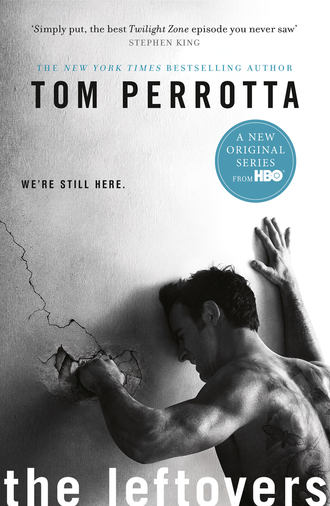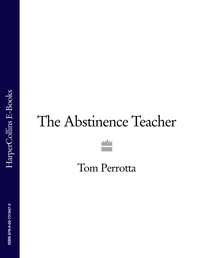
Полная версия
The Leftovers
“I know what you’re thinking, and I don’t blame you. I’m just telling you what happened. I’m not saying I fixed her or cured her, or anything like that. To this day, she’s still sad. Because there’s not some finite amount of pain inside us. Our bodies and minds just keep manufacturing more of it. I’m just saying that I took the pain that was inside of her at that moment and made it my own. And it didn’t hurt me at all.”
A change seemed to come over Mr. Gilchrest. He stood up straighter and placed his hand over his heart.
“That was the day I learned who I am,” he declared. “I’m a sponge for pain. I just soak it up and it makes me stronger.”
The smile that spread across his face was so joyful and self-assured he seemed almost like a different person.
“I don’t care if you believe me. All I ask is that you give me a chance. I know you’re all hurting. You wouldn’t be here on a Saturday afternoon if you weren’t. I want you to let me hug you and take away your pain.” He turned to Reverend Kaminsky. “You first.”
The minister was clearly reluctant, but he was the host and couldn’t see any polite way out. He rose from his chair and approached Mr. Gilchrest, casting a skeptical sidelong glance at the audience on the way, letting them know he was just being a good sport.
“Tell me,” Mr. Gilchrest said. “Is there a special someone you’ve been missing? A person whose absence seems especially troubling to you? Anyone at all. Doesn’t have to be a close friend or member of your family.”
Reverend Kaminsky seemed surprised by the question. After a brief hesitation he said, “Eva Washington. She was a classmate of mine in divinity school. I didn’t know her that well, but …”
“Eva Washington.” Mr. Gilchrest stepped forward, the sleeves of his suit jacket creeping toward his elbows as he spread his arms. “You miss Eva.”
At first it seemed like an unremarkable social hug, the kind people exchange all the time. But then, with startling abruptness, Reverend Kaminsky’s knees buckled and Mr. Gilchrest grunted, almost as if he’d been punched in the gut. His face tightened into a grimace, then relaxed.
“Wow,” he said. “That was a lot.”
The two men held each other for a long time. When they separated, the Reverend was sobbing, one hand clamped over his mouth. Mr. Gilchrest turned to the audience.
“Single file,” he said. “I have time for everybody.”
Nothing happened for a moment or two. But then a heavyset woman in the third row stood up and made her way to the front. Before long, all but a few members of the audience had left their seats. “No pressure,” Mr. Gilchrest assured the holdouts. “I’m here when you’re ready.”
Tom and Hubbs were near the end of the line, so they were familiar with the process by the time their turns arrived. Hubbs went first. He told Mr. Gilchrest about Chip Gleason, and Mr. Gilchrest repeated Chip’s name before pulling Hubbs against his chest in a strong, almost paternal embrace.
“It’s okay,” Mr. Gilchrest told him. “I’m right here.”
Several seconds passed before Hubbs let out a yelp and Mr. Gilchrest staggered backward, his eyes widening with alarm. Tom thought they were about to crash onto the floor like wrestlers, but somehow they managed to remain upright, performing a precarious dance until they regained their balance. Mr. Gilchrest laughed and said, “Easy, partner,” patting Hubbs gently on the back before letting him go. Hubbs looked wobbly and dazed as he returned to his seat.
Mr. Gilchrest smiled as Tom stepped forward. Up close his eyes seemed brighter than Tom had expected, as if he were glowing from within.
“What’s your name?” he asked.
“Tom Garvey.”
“Who’s your special someone, Tom?”
“Jon Verbecki. This kid I used to know.”
“Jon Verbecki. You miss Jon.”
Mr. Gilchrest opened his arms. Tom stepped forward, into his strong embrace. Mr. Gilchrest’s torso felt broad and sturdy, but also soft, unexpectedly yielding. Tom felt something loosen inside of him.
“Give it here,” Mr. Gilchrest whispered in his ear. “It doesn’t hurt me.”
Later, in the car, neither Tom nor Hubbs had much to say about what they’d felt in the church basement. They both seemed to understand that describing it was beyond their powers, the gratitude that spreads through your body when a burden gets lifted, and the sense of homecoming that follows, when you suddenly remember what it feels like to be yourself.
SHORTLY AFTER midterms, Tom received a flurry of increasingly agitated voice, text, and e-mail messages from his parents, imploring him to contact them immediately. From what he could gather, the university had sent them some sort of formal warning that he was in danger of failing all his classes.
He didn’t respond for a few days, hoping the delay would give them time to cool off, but their attempts to reach him only grew more frantic and aggressive. Finally, unnerved by their threats to alert the campus police, cancel his credit card, and cut off his cell phone service, he gave in and called them back.
“What the hell’s going on up there?” his father demanded.
“We’re worried about you,” his mother cut in, speaking on a separate handset. “Your English teacher hasn’t seen you in weeks. And you didn’t even take your Poli Sci exam, the one you said you got a B on.”
Tom winced. It was embarrassing to be caught in a lie, especially one so big and stupid. Unfortunately, all he could think to do was lie again.
“That was my bad. I overslept. I was too embarrassed to tell you.”
“That’s not gonna cut it,” his father said. “You know how much it costs for one semester of college?”
Tom was surprised by the question, and a bit relieved. His parents had money. It was a lot easier to apologize for wasting some of it than to explain what he’d been doing for the past two months.
“I know it’s expensive, Dad. I really don’t take it for granted.”
“That’s not the issue,” his mother said. “We’re happy to pay for your college. But something’s wrong with you. I can hear it in your voice. We should never have let you go back there.”
“I’m fine,” Tom insisted. “It’s just that the frat stuff’s been taking up way more of my time than I thought it would. Hell Week’s the end of this month, and then everything’ll get back to normal. If I work hard, I’m pretty sure I can pass all my classes.”
He heard an odd silence at the other end of the connection, as if each of his parents was waiting for the other one to speak.
“Honey,” his mother said softly. “It’s too late for that.”
AT THE frat house that night, Tom told Hubbs that he was withdrawing from school. His parents were coming on Saturday to take him home. They had his whole life figured out—a full-time job at his father’s warehouse, and two sessions a week with a therapist who specialized in young adults with grief disorders.
“Apparently I have a grief disorder.”
“Welcome to the club,” Hubbs told him.
Tom hadn’t mentioned it to his parents, but he’d already seen a psychologist at the University Health Service, a mustachioed Middle Eastern guy with watery eyes who’d informed him that his obsession with Verbecki was just a defense mechanism, and a common one at that, a smoke screen to distract him from more serious questions and troubling emotions. This theory made no sense to Tom—what good was a defense mechanism if it fucked up your whole life? What the hell was it defending you from?
“Damn,” said Hubbs. “What are you gonna do?”
“I don’t know. But I can’t go back home. Not right now.”
Hubbs looked worried. The two of them had grown closer in the past couple of weeks, bonding over their shared fascination with Mr. Gilchrest. They’d attended two more of his lectures, each with an audience double the size of the previous one. The most recent had been at Keuka College, and it had been thrilling to see the way he connected with a young audience. The hugging session lasted almost two hours; when it was over, he was dripping wet, barely able to stand, a fighter who’d gone the distance.
“I have some friends who live off campus,” Hubbs told him. “If you want, you can probably crash there for a few days.”
Tom packed his things, drained his bank account, and slipped out of the dorm on Friday night. When his parents showed up the next day, all they found were some books, a disconnected printer, and an unmade bed, along with a letter in which Tom told them a little about Mr. Gilchrest and apologized for letting them down. He told them that he would be traveling for a while, and promised to keep in touch via e-mail.
“I’m sorry,” he wrote. “This is a really confusing time for me. But there are some things I need to figure out on my own, and I hope you’ll respect my decision.”
HE STAYED with Hubbs’s buddies through the end of the semester, then sublet their apartment when they headed home for summer vacation. Hubbs moved in with him; they got hired as detailers at a car dealership and did volunteer work for Mr. Gilchrest in their spare time, passing out leaflets, setting up folding chairs, collecting addresses for an e-mail list, whatever he needed.
That summer things really started to take off. Someone posted a clip of Mr. Gilchrest on YouTube—it was tagged I AM A SPONGE FOR YOUR PAIN—and it went viral. The crowds at his lectures grew bigger, the invitations to speak more frequent. By September, he was renting a mothballed Episcopal church in Rochester, holding marathon Hug-fests every Saturday and Sunday morning. Tom and Hubbs sometimes manned the merch table in the lobby, selling lecture DVDs, T-shirts—the most popular one said GIVE IT TO ME on the front, and I CAN TAKE IT on the back—and a self-published paperback memoir entitled A Father’s Love.
Mr. Gilchrest traveled a lot that fall—it was the first anniversary of the Sudden Departure—giving lectures all over the country. Tom and Hubbs were among the volunteers who drove him to and from the airport, getting to know him as a person, gradually earning his trust. When the organization began expanding that spring, Mr. Gilchrest asked the two of them to run the Boston chapter, organizing and promoting a multi-campus speaking tour and doing whatever else they saw fit to increase awareness among the local college population of what he’d begun calling the Healing Hug Movement. It was exhilarating to be given so much responsibility, to have gotten in on the ground floor of a phenomenon that had taken off so unexpectedly—like working at an Internet start-up back in the day, Tom thought—but also a little dizzying, everything growing so quickly, shooting off in so many different directions at once.
During that first summer in Boston, Tom and Hubbs began hearing disturbing rumors from people they knew back at the Rochester headquarters. Mr. Gilchrest was changing, they said, letting the fame go to his head. He’d bought a fancy car, started wearing different clothes, and was paying a little too much attention to the adoring young women and teenage girls who lined up to hug him. He’d apparently begun calling himself “Holy Wayne” and hinting about some sort of special relationship with God. On a couple of occasions, he had referred to Jesus as his brother.
When he arrived in September to give his first lecture to a packed house at Northeastern, Tom could see that it was true. Mr. Gilchrest was a new man. The heartbroken father in the shabby suit was gone, replaced by a rock star in sunglasses and a tight black T-shirt. When he greeted Tom and Hubbs there was an imperious coolness in his voice, as if they were simply hired help, rather than devoted followers. He instructed them to give backstage passes to any cute girls who seemed promising, “especially if they’re Chinese or Indian or like that.” Onstage, he didn’t just offer hugs and sympathy; he spoke of accepting a God-given mission to fix the world, to somehow undo the damage caused by the Sudden Departure. The details remained vague, he explained, not because he was holding out, but because he himself didn’t know them all yet. They were coming to him piecemeal, in a series of visionary dreams.
“Stay tuned,” he told the audience. “You’ll be the first to know. The world is depending on us.”
Hubbs was troubled by what he saw that night. He thought Mr. Gilchrest had gotten drunk on his own Kool-Aid, that he’d morphed from an inspirational figure to the CEO of a messianic Cult of Personality (it wasn’t the last time Tom would hear this accusation). After a few days of soul-searching, Hubbs told Tom that he was done, that while he loved Mr. Gilchrest, he couldn’t in good conscience continue to serve Holy Wayne. He said he would be leaving Boston, heading back to his family on Long Island. Tom tried to talk to him out of it, but Hubbs was beyond persuasion.
“Something bad’s gonna happen,” he said. “I can feel it.”
IT TOOK a whole year for Hubbs to be proven right, and during that time, Tom remained a loyal follower and valued employee of the Healing Hug Movement, helping to launch new field offices in Chapel Hill and Columbus before landing a plum job at the San Francisco Center, training new teachers to run Special Someone Meditation Workshops. Tom loved the city and enjoyed meeting a batch of new students every month. He had a few affairs—the novice teachers were mostly women—but not nearly as many as he could have. He was a different person now, more self-contained and contemplative, a far cry from the frat boy with the painted face, out to get laid by any means necessary.
On paper, the movement was thriving—membership was growing steadily, money was pouring in, the media was paying attention—but Mr. Gilchrest’s behavior was becoming increasingly erratic. He was arrested in Philadelphia after being found in a hotel room with a fifteen-year-old girl. The case was eventually dismissed for lack of evidence—the girl insisted that they were “just talking”—but Mr. Gilchrest’s reputation suffered a serious blow. Several of his college lectures were canceled, and for a while, Holy Wayne became a punch line on late-night TV, the most recent incarnation of that age-old scoundrel, the Horny Man of God.
Stung by the ridicule, Mr. Gilchrest abandoned his headquarters in Upstate New York and moved to a ranch in a remote part of southern Oregon, far from prying eyes. Tom had visited only once, in mid-June, to take part in a gala three-day celebration of what would have been Henry Gilchrest’s eleventh birthday. The accommodations weren’t much—the hundred or so guests had to sleep in tents and share a few nasty Porta-Johns—but it was an honor just to be invited, a sign of membership in the inner circle of the organization.
For the most part, Tom liked what he saw—big weathered house, swimming pool, working farm, stables. Only two things bothered him: the contingent of gun-toting security guards patrolling the grounds—there had supposedly been some death threats against Holy Wayne—and the inexplicable presence of six hot teenage girls, five of them Asian, who were living in the main house with Mr. Gilchrest and his wife, Tori. The girls—they were jokingly referred to as the “Cheerleading Squad”—spent their days sunning themselves beside the pool while Tori Gilchrest power-walked by herself around the outskirts of the property, breathing forcefully through her nose while performing an elaborate series of arm exercises with light dumbbells.
Tom didn’t think she looked too happy, but on the final night of the party, Tori was the one who stepped up to the microphone on the outdoor stage and introduced the girls as Mr. Gilchrest’s “spiritual brides.” She admitted that it was an unconventional arrangement, but she wanted the community to know that her husband had asked for—and received—her blessing for each and every one of these new marriages. The girls—they were standing behind her, smiling nervously in their pretty dresses—were all sweet and modest and surprisingly mature for their ages, not to mention completely adorable. As everyone knew, she herself could no longer bear children, and this was a problem, because God had recently revealed to Holy Wayne that it was his destiny to father a child who would repair the broken world. One of these girls—Iris or Cindy or Mei or Christine or Lam or Anna—would be the mother of this miracle child, but only time would tell which one. Mrs. Gilchrest concluded by saying that the love between her and Holy Wayne remained as strong and vibrant as it had been on their wedding day. She assured everyone that they continued to live together very happily as husband and wife, partners and best friends forever.
“Whatever my husband does,” she said, “I support him a hundred and ten percent and I hope you will, too!”
There was a roar from the crowd as Mr. Gilchrest bounded up the steps and made his way across the stage to present his wife with a bouquet of roses.
“Isn’t she the greatest?” he asked. “Am I the luckiest guy in the world or what?”
The spiritual brides began to applaud as Mr. Gilchrest kissed his legal wife, and the crowd followed suit. Tom did his best to clap along with everyone else, but his hands felt huge and leaden, so heavy he could barely pry them apart.
CHRISTINE SAID she was bored, trapped in the house all day like a prisoner, so Tom took her for a whirlwind tour of the city. He was glad for an excuse to get away from the office. It was like a funeral in there—no seminars in session, nothing to do except sit around with Max and Luis, answering e-mails and the occasional phone call, parroting the talking points they’d been given by headquarters: The charges are bogus; Holy Wayne is innocent until proven guilty; an organization is bigger than one man; our faith remains unshakable.
It was a classic San Francisco day, cool and bright, milky morning fog surrendering reluctantly to a clear blue sky. They did the usual stuff—cable car and Fisherman’s Wharf, Coit Tower and North Beach, Haight-Ashbury and Golden Gate Park—Tom playing the role of jovial guide, Christine chuckling at his lame jokes, grunting politely at his half-remembered facts and recycled anecdotes, just as happy as he was to think about something besides Mr. Gilchrest for a while.
He was surprised at how well they were getting along. Back at the house, she’d been a bit of a problem, a little too interested in pulling rank, reminding everyone of her exalted status within the organization. Nothing was good enough—the futon was lumpy, the bathroom was gross, the food tasted weird. But the fresh air brought out a previously concealed sweetness in her, a bouncy teenage energy that had been hidden beneath the regal attitude. She dragged him into vintage clothing stores, apologized to homeless guys for her lack of spare change, and stopped every couple of blocks to gaze down at the bay and pronounce it awesome.
Christine kept moving in and out of focus on him. Yes, she was a visiting dignitary—Mr. Gilchrest’s wife or whatever—but she was also just a kid, younger than his own sister and a lot less worldly, a small-town Ohio girl, who, until she ran away from home, had never been to a city bigger than Cleveland. But not really like his sister, either, because people didn’t stop and stare at Jill when she walked down the street, tripped up by her unearthly beauty, trying to figure out if she was famous, if they’d seen her on TV or something. He wasn’t sure how to treat Christine, if he should think of himself as a personal assistant or a surrogate big brother, or maybe just a helpful friend, a caring, slightly older guy showing her around an unfamiliar metropolis.
“I had a nice day,” she told him over a late-afternoon snack at Elmore’s, a café on Cole Street that was full of Barefoot People, hippies with bullseyes painted on their foreheads. The Bay Area was their spiritual homeland. “It’s good to be out of the house.”
“Anytime,” he said. “I’m happy to do it.”
“Sooo.” Her voice was low, slightly flirtatious, as if she suspected him of withholding good news. “Have you heard anything?”
“About what?”
“You know. When he’s getting out. When I can go back.”
“Back where?”
“To the Ranch. I really miss it.”
Tom wasn’t sure what to tell her. She’d seen the same TV reports he had. She knew that Mr. Gilchrest had been denied bail, and that the authorities were playing hardball, seizing the organization’s assets, arresting several top and midlevel people, squeezing them for damaging information. The FBI and State Police made no secret of the fact that they were actively searching for the underage girls Mr. Gilchrest claimed to have married—not because they’d done anything wrong, but because they were victims of a serious crime, endangered minors in need of medical care and psychological counseling.
“Christine,” he said, “you can’t go back there.”
“I have to,” she told him. “It’s where I live.”
“They’ll make you testify.”
“No, they won’t.” She sounded defiant, but he could see the doubt in her eyes. “Wayne said everything would be okay. He’s got really good lawyers.”
“He’s in big trouble, Christine.”
“They can’t put him in jail,” she insisted. “He didn’t do anything wrong.”
Tom didn’t argue; there was no point. When Christine spoke again, her voice was small and frightened.
“What am I supposed to do?” she asked. “Who’s gonna take care of me?”
“You can stay with us for as long as you want.”
“I don’t have any money.”
“Don’t worry about it.”
This didn’t seem like the right time to tell her that he didn’t have any money, either. He and Max and Luis were technically volunteers, donating their time to the Healing Hug Movement in exchange for room and board and a paltry stipend. The only cash in his pocket had come from the envelope Christine had handed him when she’d arrived, two hundred dollars in twenties, the most money he’d seen in a long time.
“What about your family?” he asked. “Is that a possibility?”
“My family?” The idea seemed funny to her. “I can’t go back to my family. Not like this.”
“Like what?”
She tucked her chin, examining the front of her yellow T-shirt, as if searching for a stain. She had narrow shoulders and very small breasts, hardly there at all.
“Didn’t they tell you?” She ran her palm over her flat belly, smoothing the wrinkles from her shirt.
“Tell me what?”
When she looked up, her eyes were shining.
“I’m pregnant,” she said. He could hear the pride in her voice, a dreamy sense of wonder. “I’m the One.”
THE CARPE DIEM
JILL AND AIMEE HEADED OUT right after dinner, cheerfully informing Kevin that they didn’t know where they were going, what they were doing, who they would be with, or when they might be home.
“Late,” was all Jill could tell him.
“Yeah,” agreed Aimee. “Don’t wait up.”
“It’s a school night,” Kevin reminded them, not bothering to add, as he sometimes did, that it was odd how going nowhere and doing nothing could take up so much time. The joke just didn’t seem that funny anymore. “Why don’t you try to stay sober for once? See what it’s like to wake up in the morning with a clear head.”
The girls nodded earnestly, assuring him that they had every intention of heeding this excellent advice.
“And be careful,” he continued. “There are a lot of freaks out there.”
Aimee grunted knowingly, as if to say that no one needed to tell her about freaks. She was wearing kneesocks and a short cheerleader skirt—light blue, not the maroon and gold of Mapleton High—and had deployed her usual unsubtle arsenal of cosmetics.
“We’ll be careful,” she promised.
Jill rolled her eyes, unimpressed by her friend’s good-girl act.
“You’re the biggest freak of all,” she told Aimee. Then, to Kevin, she added, “She’s the one people need to watch out for.”
Aimee protested, but it was hard to take her seriously, given that she looked less like an innocent schoolgirl than a stripper halfheartedly pretending to be one. Jill gave the opposite impression—a scrawny child playing dress-up—in her cuffed jeans and the oversized suede coat she’d borrowed from her mother’s closet. Kevin experienced the usual mixed feelings seeing them together: a vague sadness for his daughter, who was so clearly the sidekick in this duo, but also a kind of relief rooted in the thought—or at least the hope—that her unprepossessing appearance might function as a form of protective camouflage out in the world.






